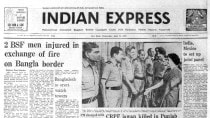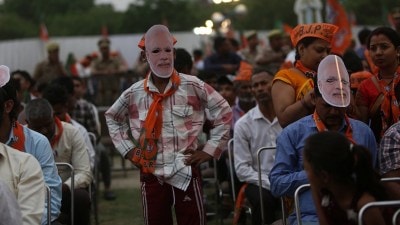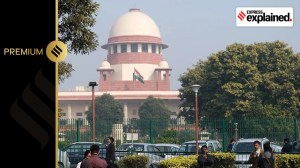- India
- International
Pakistan, in Modi’s eyes
If he becomes PM, Pak policy will define his room for manoeuvre at home and abroad.
 The deeply polarised Indian debate on secularism and the controversy over Modi’s role in the 2002 Gujarat riots have, however, reinforced fears in Pakistan about a BJP victory in these elections.
The deeply polarised Indian debate on secularism and the controversy over Modi’s role in the 2002 Gujarat riots have, however, reinforced fears in Pakistan about a BJP victory in these elections.
If he becomes PM, Pak policy will define his room for manoeuvre at home and abroad.
If the rednecks in the BJP want to banish the critics of Narendra Modi to Pakistan, the only ones going across the western border right now seem to be aides to the party’s prime ministerial candidate. A report published in the Sunday edition of The Hindu cited official sources in Islamabad to say that unnamed advisors of Modi had travelled recently to Pakistan to meet the leaders of the Muslim League, which runs the federal government as well as the provincial government in West Punjab.
As Pakistan-bashing gains some traction in the BJP’s election campaign, Modi has sought to calm the fears it has generated in the region and beyond. In his interview to ANI last week, Modi suggested that there would be no radical departures in India’s foreign policy, especially towards Pakistan, under a government led by him. He underlined, instead, the importance of engaging Pakistan and insisted that “anger” can’t be the basis for a policy towards our western neighbour.
If the reports that Modi has sent emissaries to Pakistan are true, they indicate a recognition of the need to reassure leaders across the border that, were he to become prime minister, he would not be throwing a grenade at the bilateral relationship. Equally important is Modi’s reported outreach to separatist leaders in Kashmir and his decision to clear the confusion on India’s nuclear policy created by the BJP manifesto.
The claims of Syed Ali Shah Geelani, the hardline Hurriyat leader in Kashmir, about meeting Modi’s “emissaries” have been formally denied by the BJP. But it makes eminent political sense for Modi to suggest he is open to engaging everyone in Kashmir, including separatists, in his quest for peace in the state that has endured so much suffering.

Modi also appears to have understood the need to address the widespread international concern that a government led by him might abandon India’s traditional nuclear restraint and adopt the more risky approaches. If the BJP manifesto talked about revising the nuclear doctrine, Modi made it absolutely clear there was no question of changing India’s policy on the no first use of atomic weapons.
The government in Pakistan, like most others, has no problem in recognising that the BJP’s rhetoric during elections is not necessarily a reflection of the party’s policies when in government. Islamabad is putting out signals that it is eager to open a dialogue with the next government and is ready for formal political contact with it at the earliest. The deeply polarised Indian debate on secularism and the controversy over Modi’s role in the 2002 Gujarat riots have, however, reinforced fears in Pakistan about a BJP victory in these elections. The lower the political debate in India sinks, the greater the political discomfort in Pakistan will be with a Modi-led government.
At the same time, there is some hope in Pakistan that a strong leader like Modi might be better equipped than Prime Minister Manmohan Singh to move the bilateral relationship forward. Pakistani leaders across the political spectrum and in the military have been deeply disappointed with the UPA government, which repeatedly raised expectations of a big breakthrough in bilateral relations over the last decade but did not have the political courage to follow through.
India’s political passions on secularism and communalism make little sense in Pakistan, which is a Muslim-majority state and an Islamic republic. Pakistan’s foreign policy establishment attaches little operational value to secularism in engaging India.
Islamabad remembers that Atal Bihari Vajpayee, representing a “Hindu nationalist” government, travelled to Pakistan twice. Under far more difficult circumstances, Vajpayee had kept the dialogue going with Pakistan and launched bold initiatives. Pakistan is acutely aware that the “secular” Congress would not even let Manmohan Singh travel across the border, despite repeated requests from General Pervez Musharraf, former President Asif Ali Zardari and Nawaz Sharif. Nor is it a secret that the champions of secularism in the cabinet, like Arjun Singh and A.K. Antony, were the most vociferous opponents of any reasonable accommodation with Pakistan.
What matters to Islamabad is not the political label attached to Modi, but the kind of policies he might pursue if he comes to power. If Modi embarks on a confrontation with the Muslim minority at home and adopts an adventurous policy towards Pakistan, his government would quickly be weakened and become vulnerable to multiple pressures — regional and international.
On the other hand, if Modi addresses the genuine fears of the Muslim minority at home and begins an engagement with Pakistan, his room for manoeuvre at home and abroad will significantly improve. Given the unprecedented negative international image Modi has acquired, a sensible and pragmatic approach to Pakistan could bring him extraordinary diplomatic rewards. His recent statements do underline an awareness of the imperative for political moderation at home and abroad. His problems in pursuing moderate policies if he comes to power are likely to come from within his own camp.
Like the Congress, the BJP too is very conservative in its worldview. With his stature in the BJP, Vajpayee managed to keep the party at a distance from the making of foreign policy. Yet, when it came to Pakistan, Vajpayee had to constantly fend off sniping from his seniormost colleague in the party and the cabinet, L.K. Advani.
Modi is likely to encounter resistance from the BJP’s old guard in a broad range of policy areas. If he does become the next prime minister, he can develop a sensible policy towards Pakistan and effectively pursue India’s larger regional and global interests only if he is able to quickly establish unrivalled political authority over the BJP after the elections and win full freedom to conduct India’s foreign policy.
The writer, a distinguished fellow at the Observer Research Foundation, Delhi, is contributing editor of ‘The Indian Express’
express@expressindia.com
EXPRESS OPINION
More Explained
Apr 25: Latest News
- 01
- 02
- 03
- 04
- 05










































